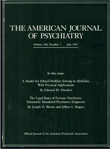Apolipoprotein E epsilon 4 allele and pupillary response to tropicamide
Abstract
OBJECTIVE: This study was designed to investigate in cognitively normal subjects the possible association between hypersensitive pupil dilation response to the cholinergic antagonist tropicamide and the presence of the apolipoprotein E epsilon 4 (APOE4) allele, a well-defined genetic risk factor for Alzheimer's disease. METHOD: The authors measured tropicamide-induced changes in pupil area in 44 cognitively normal Japanese subjects with and without the APOE4 allele. RESULTS: The subjects with the APOE4 allele had significantly greater increases in pupil area than the others. The significant correlation of changes in pupil area with age for the subjects with the APOE4 allele was lacking for those without this allele. CONCLUSIONS: The results suggest that a hypersensitive pupil dilation response to tropicamide is already present in cognitively normal individuals with the APOE4 allele. This association also suggests the potential involvement of APOE4 in the mechanism of pupil dilation.



